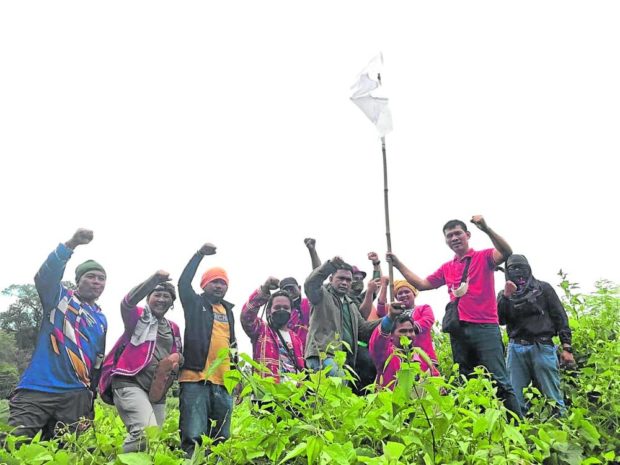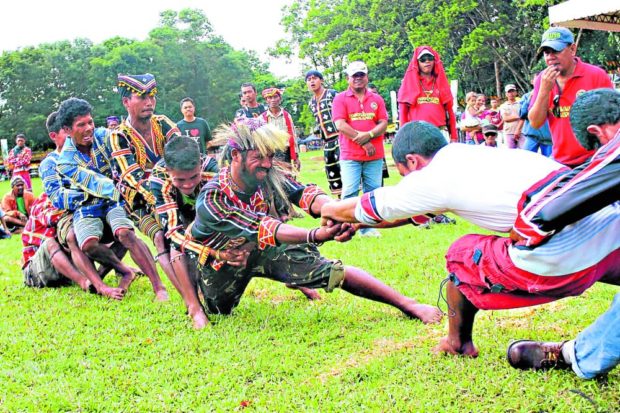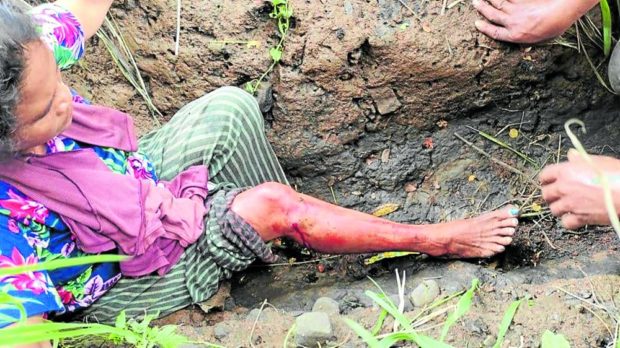Fate of Mindanao IPs at stake in polls

CELEBRATION Presidential candidate Leodegario “Ka Leody” de Guzman (second from right) celebrates with members of the Manobo-Pulangiyon tribe after they entered a portion of their ancestral domain in Quezon, Bukidnon, on April 19. —PHOTO FROM FACEBOOK PAGES OF ROY CABONEGRO AND KA LEODY DE GUZMAN
(Last of a series)
On April 19, Partido Lakas ng Masa presidential candidate Leodegario “Ka Leody” de Guzman accompanied members of the indigenous Manobo-Pulangiyon tribe to occupy their ancestral domain in Quezon, Bukidnon, as part of his campaign sortie in Mindanao.
Unexpectedly, he got embroiled in a conflict that pitted the tribe against a powerful agribusiness firm in the last five years, and put his life in danger as gunshots met them in the bushy field not far from a sprawling pineapple plantation.
Caught on video and broadcast live on social media, the incident put the spotlight on the travails of the Manobo tribe whose members were driven out of their land by armed men in 2017.
By figuring in the incident, Ka Leody was able to lend his stature as a presidential candidate to bringing to the fore the seemingly forgotten issues of indigenous peoples in Mindanao and the rest of the country.
Article continues after this advertisementLand dispossession is foremost among these issues, as shown in the case of the Manobo in Bukidnon who had a certificate of ancestral domain claim covering more than 1,000 hectares of land, a big portion of which was leased by the government for grazing cattle, although in later periods until today, it was used to grow pineapples for export.
Article continues after this advertisementThe lease expired in 2018 and was no longer renewed, making the National Commission on Indigenous Peoples (NCIP) the sole authority to dispose of the estate to the tribe under the Indigenous Peoples’ Rights Act of 1997 (Ipra). But until today, the tribe could not see meaning in their ownership of the land as they could not possess it even as there are no legal impediments to them doing so.

STRUGGLE FOR SURVIVAL Indigenous peoples in Mindanao are fighting to preserve their way of life amid massive encroachment of development projects and corporate interests into their lands, pushing them into the margins of society. —PHOTO BY ERWIN M. MASCARIÑAS
Business interests
Obviously as an offshoot of the public outcry over the April 19 incident, the NCIP ordered pineapple grower Kiantig Development Corp., which has links to Quezon Mayor Pablo Lorenzo III, to vacate the land.
Given the richness of the indigenous peoples’ (IP) ancestral lands, agribusiness interests flock into these for crop-growing ventures. In most cases, they are able to enter through the employment of intimidation and short circuiting the consent process required by Ipra. These resulted in a situation where the true owners of the land live miserable lives in the margins of vast plantations that rake in huge profits for its corporate owners.
After being driven away in 2017, the Manobo of Quezon established temporary shelters along the national highway, devoid of basic services such as water supply, and exposed to the dangers of passing vehicles.
This is a tale repeated in other communities in Mindanao where 61 percent of the country’s estimated 12 to 18 million IPs live.
Of the country’s 30-million ha land area, some 7.7 million ha are occupied by indigenous peoples and some 5.7 million ha were already covered by Certificates of Ancestral Domain Title (CADT) as of April 30, 2019.

Armed men unleashed a volley of gunfire that wounded five people, including a woman. —PHOTO FROM FACEBOOK PAGES OF ROY CABONEGRO AND KA LEODY DE GUZMAN
Under attack
About 3 million ha, or 53 percent, of the total areas with CADT awards are in Mindanao. Apart from plantations, these lands are the subject of interest for mining and energy projects.
Land dispossession uproots the tribes from their principal source of living, hence, they wallow in poverty, a situation ripe for resistance and dissent.
According to the 1Sambubungan Initiative, a coming together of IP support groups, the tribes have been under attack for defending their lands and advancing their rights over it.
It noted that under the administration of President Duterte, 92 deaths were classified as extrajudicial killings while around 160 people were victims of murder attempts.
Some 227 IPs were also illegally arrested, detained, and abducted; 27 were reportedly subjected to torture; and six enforced disappearances. 1Sambubungan describes the situation as “the human rights crisis in IP communities.”
IP rights advocates said the only hope for turning the situation around is to elect leaders, especially a president, who can overhaul and transform “the State’s framework of engagement with indigenous peoples and communities from one of aggression and marginalization to a regime anchored on the full realization of indigenous peoples rights.”
“The urgent task for the next administration is to stop the attacks against indigenous communities, bring the perpetrators to justice, initiate a process of genuine peace dialogues between the State and indigenous political structures, and support efforts to assert and advance their own development plans,” read the 1Sambubungan Initiative’s IP Electoral Agenda 2021.
It said there is a crucial need “to begin the process of restoration and healing needed in the IP communities.”
Resource guardians
Protecting the tribes’ ancestral domains, according to advocates, benefits the larger community. They pointed out that the watershed areas within ancestral domains provide water supply to adjacent rice-growing communities in the lowlands that help achieve food security.
Throughout the country, these outlying communities are estimated to have up to 25 million people as residents.
They further noted that 85 percent of the country’s key biodiversity areas are within ancestral domains.
“This points to the significant and critical role of the indigenous peoples in protecting and sustainably managing our natural resources,” 1Sambubungan stressed.
“It is then imperative that the government fulfills its mandate to protect the country’s biological resources and the environment, by protecting the ancestral domains. The protection of ancestral domains is a triple win—for the indigenous peoples, for the national interest, and the government,” the advocates said.
In the Bangsamoro region, the advocates are hoping that steps could be undertaken soon to legislate a law defining the rights of non-Moro IPs, such as over their ancestral lands.
Under the Bangsamoro Organic Law, the regional government’s charter, such power is vested in the 80-member parliament. The regional leadership earlier vowed to work on such legislation now that the life of the interim government was extended up to 2025.“
A policy shift and meaningful implementation to protect indigenous peoples and their rights to their ancestral domains are urgently needed, only then can the nation achieve real, inclusive, and collective development — one that ensures welfare for all,” 1Sambubungan said.
RELATED STORIES
NCIP orders agri firm out of Manobo land
Shots fired in Ka Leody’s visit to Manobo tribe ancestral land in Bukidnon